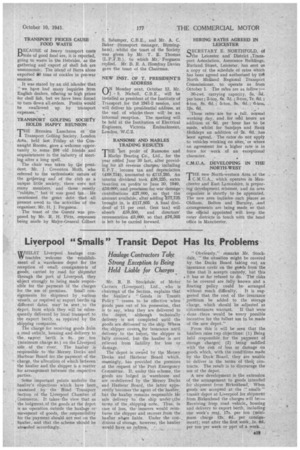Liverpool g Smalls " Transit Depot Has Its, Problems
Page 21

If you've noticed an error in this article please click here to report it so we can fix it.
Haulage Contractors Take Strong Exception to Being Held Liable for Charges ir
WHILST Liverpool haulage conVV tractors welcome the establishment of a warehouse depot for the reception of small consignments of goods, carried by road for shipment through the port of Liverpool, they object strongly to being made responsible for the payment of the charges
for the use ofpremises. Small consignments for • shipment by various vessels, or required at. export berths.00 different dates, may* be, sent to the depot; from which they i.vill he subsequently delivered by local transport to the export berth; as required by the shipping companies.
The charge. for receiving goods from a road vehicle, housing and delivery to the, export berth is 9s per ton (minimum charge 4s.) on the Liverpool side of the river, The haulier is responsible to theMersey Docks and Harbour Board for. the payment of the charge, the allocation of which between " the haulier and the shipper Is a matter for arrangement between the respective parties.
Sotne important points underlie the haulier's objections which have been. examined by the Road Transport Section of the Liverpool Chamber of Commerce. It takesthe view that as the lodgment,of the goods at the depot is an operation outside the haulage or' movement of goods, the responsibility for the payment should not rest on the haulier, and that the scheme should be amended accordingly.
Mr. R. B. Stoeirdale, of Motor Carriers (Liverpool), Ltd., who is chairman of the Section, explains that the haulier's ." Goods in Transit Policy ", ceases. to be effective when goods pass out of his possession,. that is to say, when they are delivered to the depot, although technically delivery is not completed until the goods are delivered to the ship. Where the shipper coveraitfor insurance until delivery, to the buyer, the shipper is 'fully covered, but the haulier is not relieved from liability for loss or damage. The depot is owned by the Mersey Docks and Harbour Board which, seemingly, has provided the premises at the request of the Port Emergency Committee. If, under this scheme, the goods are lodged in warehouse and are re-delivered by the Mersey Docks and Harbour Board, the latter apparently becomes'the agent of the'hanlier, but the haulier remains responsible far safe delivery to the ship undezAthe terms of the shipping note. Thus, in case of loss, the-insurers would reimburse the shipper and recover from the haulier whore liable. Under the conditions of storage, however, the haulier would have no redress.
" Obviously," remarks Mr. Stockdale, "the situation might be covered by the Docks Board taking out an insurance cover on the goads from the time that it accepts custody, but this . it has so far refused to do. The risks to be covered are fully known and a floating policy could bearranged
without much difficulty. It is suggested that the cost of the insurance pre-ft:dam he added to the storage charge, which should be adjusted' as ciicurnstances warrant. If that were. done there would be every possible incentive for the fullest use to be made of the new depot."
From this it will be seen that the hauliers raise two objections: (1) Being held responsible for the payment of storage charges; (2) being saddled with the risk of loss or damage on goods which, with the conditions made by the Dock Board, they are unable to deliver in the terms of thek contracts. The result is to discourage the use of the depot.
A new development is the extension of the arrangement to goods intended for shipment from Birkenhead. When goods are accepted at the " smalls" transit depot at Liverpool for shipment from Birkenhead the charges will be:— Receiving "falai road vehicle, housing and delivery to export berth, including one week's rent, 17s, per ton (minimum charge 12s. 6d. per consignment); rent after the first week, Is6d, per ton per week or part of a week.. ,




















































